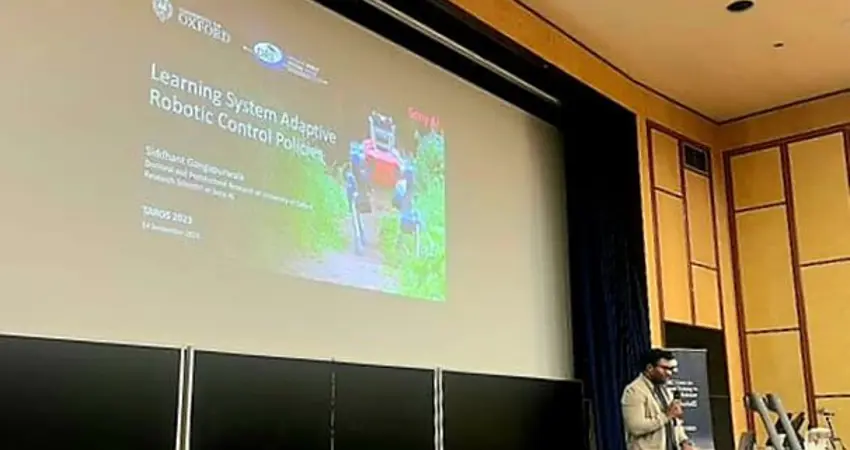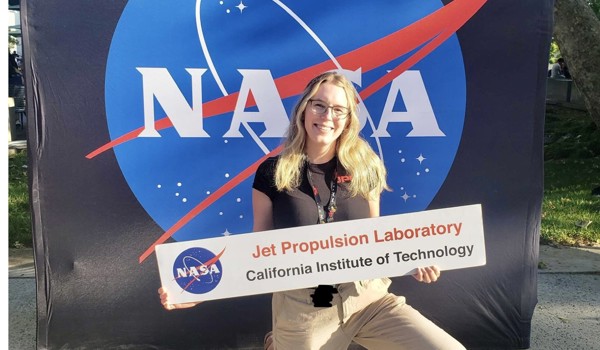09 Oct 2023
Oxford DPhil Siddhant Gangapurwala Honoured with Best UK Robotics PhD Award

The realm of robotics is vast and continuously evolving. Among the many dedicated researchers in this field, Siddhant Gangapurwala from the University of Oxford's Department of Engineering Science has recently distinguished himself by earning the prestigious Queen Mary UK Best PhD in Robotics Award at the TAROS 2023 conference.
Siddhant's foray into robotics began with his participation in the AIMS CDT program at the University of Oxford. Guided by esteemed researchers, Prof. Ioannis Havoutis and Prof. Ingmar Posner from the Oxford Robotics Institute, he delved deep into the intricacies of reinforcement learning (RL) - a method where machines learn to make decisions by trying out actions and seeing which ones yield the best results over time. With a clear objective in mind, Siddhant pioneered new approaches, aiming to craft adaptive RL policies suitable for industrial-grade robots. The goal was straightforward: to equip robots with the capability to seamlessly adjust to fluctuating system dynamics. This would enable them to execute intricate tasks in challenging environments, such as loading/unloading and navigating unpredictable terrains.
During his research journey, Siddhant introduced "Guided Constrained Policy Optimization for Dynamic Quadrupedal Robot Locomotion," abbreviated as GCPO. This pivotal work highlighted a novel approach to ensuring that robotic locomotion operations, once learned, remained safe, especially when confronted with unforeseen situations. By integrating safety-critical boundaries into the training methodology, Siddhant's solution showcased the potential to adapt dynamically while ensuring safety, paving the way for enhanced robotic applications in practical scenarios.
Siddhant's initial research laid the foundation for profound advancements in robotics. One of his standout projects was "RLOC: Terrain-Aware Quadrupedal Locomotion using Reinforcement Learning and Optimal Control." This work not only showcased state-of-the-art results but also attracted the attention of prominent figures in the industry. Specifically, Benjamin Swilling, a lead on the Spot project at Boston Dynamics, recognized the implications of Siddhant's RL framework during the International Foundation of Robotics Research (IFRR) colloquium on quadruped robotics in February 2021. Beyond academic circles, Siddhant's innovations found tangible real-world applications, evident in the deployment of RLOC at Chevron’s industrial facility in Belgium. Additionally, his contributions were highlighted in the esteemed "State of AI" report and were featured on the Computerphile YouTube Channel and IEEE Video Friday.
One pivotal takeaway from Siddhant's research was the introduction of a control framework capable of seamlessly transferring an RL policy from one robot to another. This significant capability promotes scalability and adaptability, addressing a major challenge in the robotics domain. The benefits are evident: accelerated development cycles and more resource-efficient robotic control systems.
Siddhant's work extends beyond just papers and projects. He's been a global collaborator, establishing connections from the snowy peaks of Switzerland at ETH Zurich to the bustling tech-hubs of South Korea at KAIST. In addition to his academic pursuits, Siddhant's endeavours have generated commercial interests, indicating the market potential of his innovations. His research associations with luminaries in Robotics and AI further underscore his influential position in this domain.
Siddhant Gangapurwala's doctoral research journey showcases a blend of academic rigor and practical application. His dedication to bridging theoretical frameworks with hands-on solutions has garnered respect in academia and industry. His notable recognition at TAROS 2023 is a testament to his substantial impact in the field of robotics.



